With power as the target, government employees don neta caps post-retirement to restart “public service” while enjoying impunity for the past. Safwat Zargar dwells on some of the ‘famous’ switch-overs to politics which many believe will influence the way politics is conducted in Kashmir
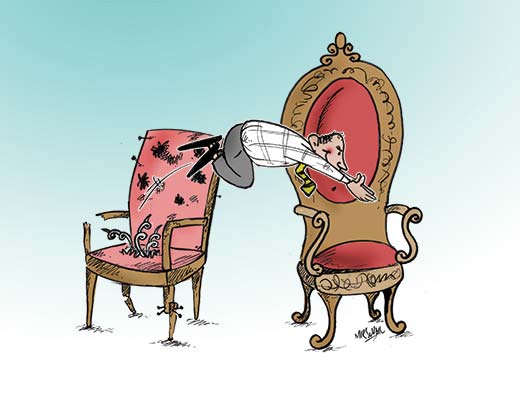 While the 2014 Lok Sabha elections served as a vital test for the political parties to check “which way the poll wind is blowing” for the state assembly polls – to be held later this year – it also amplified a trend of in-service senior government bureaucrats, retired professionals and police officials, joining political parties to start their second innings.
While the 2014 Lok Sabha elections served as a vital test for the political parties to check “which way the poll wind is blowing” for the state assembly polls – to be held later this year – it also amplified a trend of in-service senior government bureaucrats, retired professionals and police officials, joining political parties to start their second innings.
Almost every week since Lok Sabha election results were out, an ex-government official or an official who has recently achieved superannuation is being seen in the middle of sparkling garlands and congratulations, while being welcomed into political parties by party patrons. In some cases, a few government officials have opted for voluntary retirement to jump in the political tides.
Ironically, many of those joining political parties still have cases of corruption and fraud, pending with the state vigilance department, sources say.
No major political party in Kashmir – be it National Conference (NC), People’s Democratic Party (PDP) or Congress – is unwary of this phenomenon, which has, according to political experts, raised questions about the “allegiance and loyalty” of the government servants during their tenure as officials. The pattern cuts across every kind of field from educationists and government broadcasters to police officials and policy-level bureaucrats.
Even though the trend is showing an increasing graph of ex-officials and voluntarily-retired government servants joining PDP, which bagged all the three Lok Sabha seats in Valley, NC and Congress, though less in number, are also absorbing the retired lot. Caught in the net of scoring political goals ahead of assembly polls, the parties are at loggerheads, alleging each other of becoming a “safe haven” for bureaucrats aspiring for political power. However, a cursory look at the composition of political parties in the state reveals that most of the parties in the state and as well as in mainland India have people who were bureaucrats at one point of time in their careers.
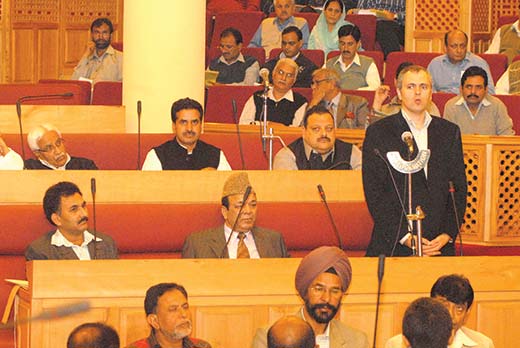
In recent memory, the bureaucratic-politico affinities date back to 2008 when chief secretary B R Kundal resigned from his post to join Congress, only to be inducted in the council of ministers days later. However, he was only following the path of his predecessors – Sheikh Ghulam Rasool and Vijay Bakaya – who had joined NC immediately after their retirement.
While the PDP says “people from different fields are coming into its fold due to its mass appeal,” NC isn’t digesting the narrative of “good and reputable” bureaucrats joining PDP.
“We don’t have any problem with ex-bureaucrats joining PDP but the kind of bureaucrats joining it,” says Junaid Azim Mattu, NC spokesperson. “Almost all of them have corruption cases pending with state vigilance department.”
Questioning whether NC doesn’t have bureaucrats as its members, PDP spokesperson, Nayeem Akhtar says, “PDP is not the only party which has attracted bureaucrats to its fold. It was during the NC rule that two chief secretaries joined the ruling party within days of their retirement. NC can’t teach us morality.”
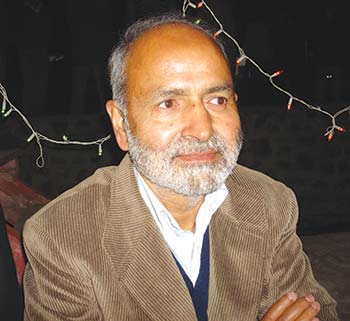
“Yes, NC too has bureaucrats as its members, but all of them were clean and able bureaucrats who had an excellent track record as officials of the state,” Mattu says. “But PDP has those men who are of questionable repute.”
For Akhtar, “it is not only the bureaucrats who are joining PDP but intellectuals, businessmen and professionals, articulating the revival of educated and dynamic people joining politics.”
Adding further, Akhtar says, “It is because of the peculiar situation Kashmir witnessed post-Indira-Abdullah accord of 1975, which again brought Sheikh Abdullah into mainstream politics. Sheikh’s comeback attracted many young men and leaders to join politics which came to a halt in 1987 when the Muslim United Front (MUF) – an amalgam of pro-freedom religio-socio-political organisations – contested elections. However, when the elections were rigged in favour of NC, it developed a situation where no political recruitments took place.”
“The trend is now changing again and this time people are inspired by the PDP of Mufti Mohammad Sayeed. I guess it is part of that transitional phase that day by day people from all fields are joining PDP,” he says.
Akhtar, an erstwhile bureaucrat himself, says, “I agree that I might be occupying somebody’s position, who as a result of the peculiar political situation in Kashmir, were pushed back to the separatist camp or are now lying in the graves.”
He, however, is quick to add “being a bureaucrat is not a disqualification to join politics.”
On the other hand, Sartaj Madni, former Deputy Speaker, J&K Legislative Assembly and PDP legislator, while toeing the party line, says “it is because of NC’s frustration, after their rout in the parliamentary elections, they are criticising joining of senior bureaucrats and police officers in PDP.”
“PDP’s people-friendly agenda has attracted them.”
Throwing some light on the track record of bureaucrats affiliating with PDP, NC’s spokesperson, Junaid Azim Mattu says: “If you look at the track record of the kind of bureaucrats and people joining PDP, it is clearly visible that all of them have a questionable reputation.”
According to Mattu, one of the bureaucrats, Syed Asghar Ali, from Chenab valley was suspended on the charges of corruption and embezzlement by Mufti Mohammad Sayeed himself during his tenure as Chief Minister. But a few years back, he was welcomed by the same Mufti in the party. Another former bureaucrat, B A Runyal, who joined PDP in June has a number of corruption cases against him.
Mattu also says: “Ashiq Hussain Bukhari, former Senior Superintendent of Police (SSP), Srinagar, has joined PDP, after his retirement, but the party hasn’t announced it officially, as it fears public reaction because Bukhari has a questionable human rights record as a police official.”
Bukhari was appointed as Srinagar city police chief at the peak of the 2010 unrest by the Omar Abdullah government. Sources close to him have strongly reacted to Mattu’s allegation. “He has not joined any political party,” one of his close relatives said. “Right now he is busy fighting a case to get his service rights.” Bukhari was denied IPS and this has sent him knocking at the judiciary’s door.
Another controversial police official according to Mattu speaks volumes about the kind of party the PDP is. “At the time of the death of NC’s Haji Yusuf, who was given in the custody of IGP Raja Ajaz Ali, Mufti Mohammad Sayeed had said that he (Raja Ajaz) is the killer of Yusuf. If he was a killer then how can he join his party?”
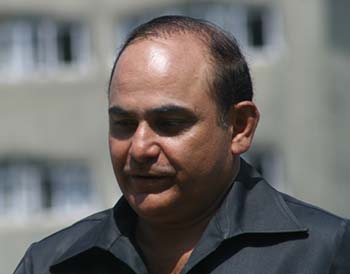
Raja Ajaz Ali’s becoming a part of PDP, later invoked reaction even from J&K Chief Minister Omar Abdullah, who was quick to question PDP’s “double standards” at the time of Haji Yousuf’s death. “PDP projected the unfortunate death of Haji Yousuf in a manner as if I had committed murder myself. They levelled serious allegations against the then IG Crime (Raja Aijaz Ali) which is not hidden. The pen-inkpot people branded him the murderer. Today the same police officer (post-retirement) is their candidate from Uri assembly seat,” Chief Minister, Omar Abdullah told NC workers at a party convention in Handwara last month.
Taking a dig also at PDP’s candidate for the Khanyar assembly seat and former trade union leader, Khursheed Alam Wani, Mattu says “Alam has serious criminal corruption charges against him. Alam is a promising change in Srinagar if he wins the elections, while his son has applied for a licence to run wine shops in Srinagar.”
“He was just a government employee in Food and Supplies department, how come he became an owner of stone crushers, factories and flour mills,” Mattu questions. “It was Alam who always tried to manipulate and sabotage the demands of employees demanding pension and other benefits from the government, for his political mileage,” he says.
In a place where politics has usually remained a dynastic affair, the phenomenon of bureaucrats turning into politicians is being looked as “disastrous that will only worsen the political setup of the state” by political analysts.

“It is a problem because the function of bureaucracy is different in a democratic setup,” says Professor of Political Science, Gul Mohammad Wani, who is also the Director of the Institute of Kashmir Studies (IKS), Kashmir University.
“There are two hallmarks of a committed bureaucracy – rationality and neutrality – but unfortunately, top officials in the state have never remained neutral. Bureaucratic principles in a government setup are in total contradiction when its functioning is manipulated by political interests and quest for power,” he says.
On the other hand, Dr Sheikh Showkat Hussain, who teaches Law at the Central University of Kashmir, believes “the bureaucrats in Kashmir are careerists who always worship the rising sun. At this juncture of time, they think that politics is a choice that will give them power, so they choose it.”
Hussain, however, feels, “ in Kashmir, politics has never been mass-driven but manipulated and it is a part of that process.”
Don’t joining political parties raise questions over the loyalty of an official while serving the state? “They were loyal to power only. Many of those joining pro-India political parties were once advisers of pro-freedom and armed resistance groups in Kashmir,” Hussain informs.
Senior journalist and historian, Zahir ud Din says the trend of bureaucrats and other infamous and influential men joining politics is not new to Kashmir because New Delhi wanted a democratic face in Kashmir.
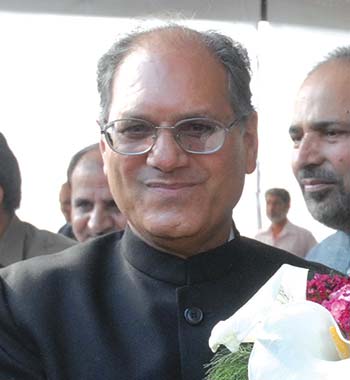
“New Delhi always installed selective people in Kashmir to run the drama of democracy. In most cases, these men were more loyal than the king. This is not a new phenomenon, it has been happening in the past as well.”
“These bureaucrats and police officers are actually key figures of political parties – even while serving as officials of the state – who are patronized by politicians to derive benefits from them. It is just the extension of that relationship which culminates with becoming a part of pro-Indian political parties,” Zahir ud Din says.
With elections happening in October and the ‘shine’ of recent PDP’s win attracting many political parties mostly PDP, it has also intensified the academic debate going on for years in India about a “cooling period” of some years that will put time-bound restrictions on a bureaucrat before joining politics.
Professor Wani at Kashmir University puts it this way: “Politics is a different game altogether with peculiar dynamics. It doesn’t have any criteria. A person’s class, education level or religion, has nothing to do with the political success of an individual, rather contrary is the case. Sometimes even educated people can be dangerous politicians. However, the exercise of franchise by a conscious voter is something which determines how far they will accept a leader. And that is something which can restrict this phenomenon.”
“We can’t deny a person’s desire to serve people in different capacities but the problem is there is a very thin line between the functioning of bureaucracy and the politician’s agenda,” he says.
What will be the consequences of this trend in future remains to be seen but experts have a consensus about its “worrying implications” in future.
“This is bound to have implications in the longer run because when the trend of joining politics after retiring as a bureaucrat will achieve the status of the norm, it will result in pre-selection of political inclinations among the younger and existing bureaucracy,” Wani says.
“Our state assembly has four ex-chief secretaries serving as lawmakers. It will increase in future.”
“Politics in Kashmir was always dirty,” says Dr Sheikh Showkat Hussain, a regular columnist and political analyst, “with this phenomenon, it will become filthier.”















